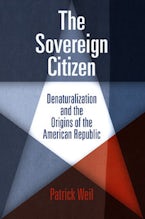
Trump's threats to denaturalize and deport Musk, his erstwhile buddy provideded me with an opportunity to do a little research. Birthright citizenship provided in the 14th Amendment was, of course, to assure that slaves became instant citizens with all its rights and privileges. Those privileges were at risk in the early 20th century.It's an often overlooked but deeply important chapter in American history—one that complicates our modern sense of what it means to be a citizen of the United States.
Today, most Americans take their citizenship for granted. They feel secure in their rights: free speech, the ability to move or marry freely, and the right to challenge their government without fear. But as historian Patrick Weil explores in The Sovereign Citizen, this sense of security is relatively recent—and historically more fragile, especially for naturalized citizens.
A turning point came with the Naturalization Act of 1906. This federal law standardized the process of becoming a citizen and created the Bureau of Immigration and Naturalization to oversee it. For the first time, applicants were required to speak English, and naturalization records had to be filed uniformly and in English. While the act was intended to bring order and consistency, it also gave the federal government powerful new tools. One of these was denaturalization—the ability to revoke citizenship if it was obtained fraudulently.
Over time, that authority expanded in troubling ways. Denaturalization wasn’t limited to fraud—it came to include political affiliations deemed “un-American.” The 1909 case of Emma Goldman, a prominent anarchist, marked one of the earliest and most famous uses of this power for political reasons.
Throughout the early and mid-20th century, the U.S. government used denaturalization laws as a way to police ideology. But by the 1950s and '60s, the Supreme Court began to push back. In a series of landmark cases, justices debated whether the government had the constitutional right to strip people of their citizenship so easily. After decades of legal conflict, the Warren Court finally affirmed a profound principle: that sovereignty belongs to the citizen—not the state.
Citizenship in America has not always been a stable or guaranteed status. Weil's account sheds light on how legal frameworks, political fears, and shifting notions of national loyalty have shaped—and sometimes threatened—the very idea of what it means to be American.
No comments:
Post a Comment